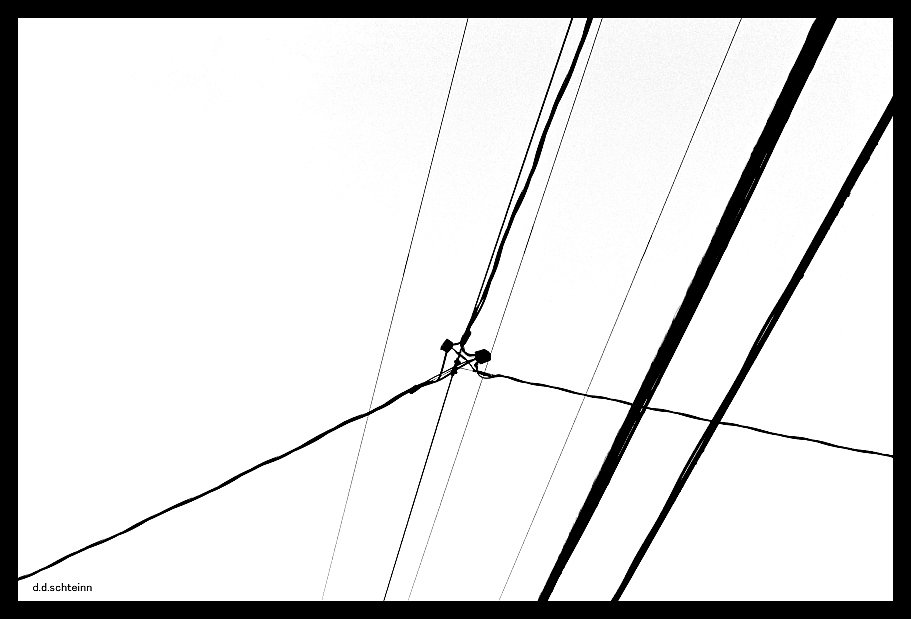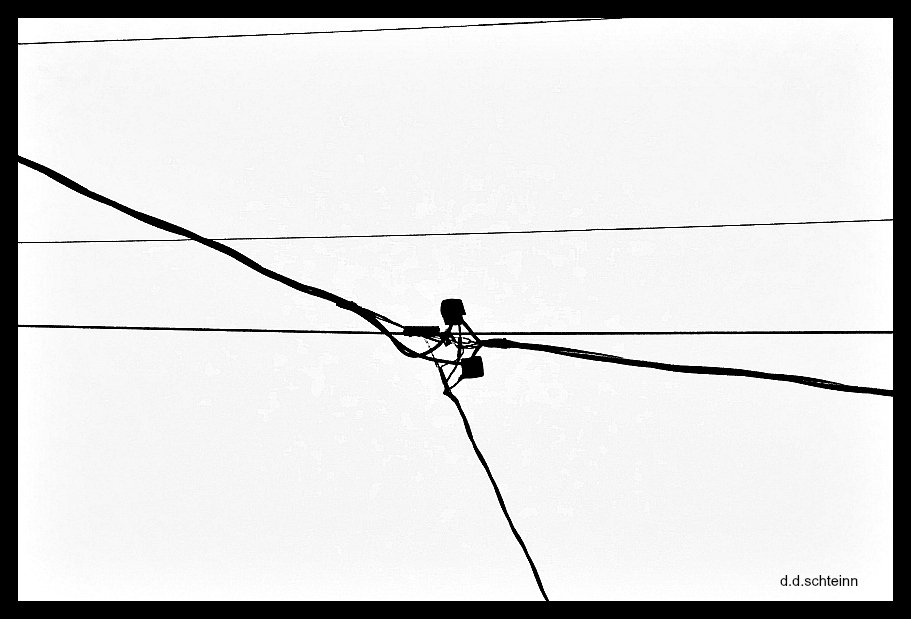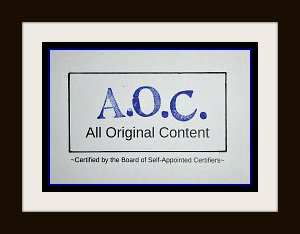
It's All In The Wires
Wires. They just hang up there in the air above our heads throughout our daily life. A silent, yet very important part of the cities and towns containing everyone I know in this world. The ubiquitous wires of our electrified life. Just hanging from their poles, doing their wiry thing day in and day out.
We drive and walk under them all day long. Yet give them very little thought beyond the occasional, "Ooh, a bird on the wire." Or when they get pulled down by a large tree in an ice event, and nothing at home works anymore. THEN we give them a second thought. "When are they going to get out and fix the stupid wires?"
An almost invisible part of our life that brings convenience to our home, allows us to talk and compute with one another on our social sites worldwide, and make a dandy perch for the various birds of the neighborhood. Those wonderful wires.
Historical Perspectives
Yes, it's all in the wires. I'm going to reminisce here for awhile, so you can skip ahead if you think pondering back in time is boring. But it was not actually all that long ago that cellular phones didn't even exist, at least not for the general public, and everyone had to talk on the 'land line'. All those thick, black wires, crisscrossing the country from one end to the other.
One Country, One Wire
It's actually quite amazing, when you sit down and think about it. Someone in Los Angeles decides to talk to their grandmother in New York, they pick up part of the phone and dial away. And get connected to grandma in a matter of seconds.
But what makes this work? A series of wires, that have to be connected, together, ALL THE WAY ACROSS THE COUNTRY. From California to New York state. To me, that's amazing. Basically one wire (yes in a grid, but still, technically, one wire), connecting two people across the entire country. One wire, 2500 miles long, carrying grandma's voice to her grandson in sunny LA. At just about the speed of sound. Pretty amazing.
Talking Into A Large, Square Brick
I actually kind of miss the old phones of the wire'd day. Those huge, square, chunky things with a curly-Q cord connecting the 'hand set' to the large, cinder-block part of the rest of the phone. They certainly were big, and they WERE heavy. Think railroad construction. Everything is large, extremely well made, and designed to last for years and years and years.
Many is the time an errant burglar got bludgeoned within an inch of his life for sneaking into an open window at night, while someone was talking to grandma on the phone. There was even a nifty little 'handle' where the received usually sat, to help with this endeavor. Just curl your fingers under the little shelf, and swing away. No more burglar coming through the open window tonight.
And what about those push-buttons? They were HUGE. You could almost dial the thing with your forehead, if the occasion arose. Though I have no idea WHY anyone would want to dial the phone with their head. Unless maybe the burglar DID get in, has you tied up next to the phone stand, and that is the only way to call for help, when he steps out to the kitchen to filch a sandwich from the fridge. Guess it could come in handy. "Having troubles, just use your head."
"One Ringy Dingy"...TIMES ELEVEN!
Before the modern invention of the push buttons, there was the infamous rotary dial. A clear disc stuck to the face of the phone, with ten holes drilled in it, one for each number. Rotate the thing around with your finger, and wait forever for it to return to ground zero, so you could dial the next number.
Talk about a slow way to connect with someone. Dialing 1, area code, and the 7 digit number could take a short week to complete. Trying to hurry the dial by pushing it back to the starting point faster only made the thing mad. It just made a terrible noise and wouldn't go any faster.
They even made special mechanical pencils and ink pens with a ball on the end in the 50's and 60's, so people could rotary dial without breaking a fingernail. Good old human ingenuity.
I actually have a couple of these mechanical pencils. One has an 8-ball on the dialing end. They're really cool, but are pretty useless for dialing a cell phone, though they do still write really well. I use them all the time for taking messages from the cell phone. On good, old-fashioned, pulpy paper.
"D, It's For You"
Another advantage of the old phone, was that they were pretty much indestructible. Think RR boxcar. I had a roommate, we'll call him Ed, who loved it whenever I got a call on our phone. The thing would ring, he'd run over to answer it, find out it was for me, yell "Hey D, it's for you", then fling the whole shebang at the vertical part of the couch.
The poor phone would bounce off the back 'wall' of the couch, ricochet onto and off the seat cushions, and end up in a messy heap on the floor. The two bells inside would even ring again as it clattered onto the rug, just for good measure. Kind of like the bell used to end each round in a 15-round prize fight. Somewhat apropos.
I'd have to unravel the cords, just to talk to Mom, all the while gesturing my dis-pleasure in his general direction across the room. He would just smile, and wait for his next opportunity. I suppose it WAS excellent manual dexterity practice for me, unwinding things and talking to my mother at the same time.
And amazingly, he never once broke the phone, tossing it all about the apartment. Which was good -- if I remember right -- the things were hundreds of dollars to fix or replace. We didn't actually own them, we just rented them from Ma Bell.
Long Distance Calling
One of the DIS-advantages of the old-world phone, besides the risk of pulling a muscle carrying it around, was the price of actually possessing the thing. Just paying for the privilege of renting a phone was more than the average arm and leg. I can't remember the exact cost, but it wasn't cheap. Which made it a special thing to actually have a phone.
Most people in college grouped together to get one, and had a single phone between several different people. It was a special privileged to have one in your room. But what was truly amazing, was how much the phone company charged to actually USE the phone.
Long distance phone service costs were totally nuts. I remember many a time when a drunk roommate would get a hold of someone's phone while they were away at the library, studying for exams or something, and run up a bill to an exorbitant amount, chatting away for hours on end with their girlfriend someplace far and away in another state. This is why no one wanted to have the phone in their name. Let's face it, the exuberance of youth, UN-monitored alcohol consumption, and an expensive long distance calling rate are NOT a good combination.
A month later, the poor phone-owner gets a bill equivalent to two months rent, and they "don't even KNOW anybody in Pocatello, Idaho"!!

It's All In Their Little Feet
The most fun thing though, about having a land line phone and all those wires we conversed through, was the fun facts you could tell friends or girlfriends when you talked to them on the phone. There was a particular sound that came through the line now and then, kind of a 'squwinch-squwinching' noise, that was odd and rather annoying. And no one seemed to know where in the world it came from.
Which was perfect. I'd tell anyone willing to listen on the other end that it came from the birds on the wires between me, in the Midwest, and them, in New York. Sometimes they even believed me.
"It's the birds, on the wires. They sit up there, and squeeze the wires with their little feet, just to stay on the wire in the wind. It constricts the wires, and makes our voices sound funny as they pass through. It's all due to the birds and their strong little feet, squishing down the wire."
I miss that. What do people tell each other now, on cell phones, when the 'squwinch-squwinching' occurs today? There ARE no wires. And no birds to talk about. Only satellites and space. Somehow, it just makes the world a little less interesting.
Finto
Do you have any memories of the old phone system, or other interesting points about phone lines and wires and birds, that you'd like to discuss? If so, please feel free to chime in, and comment below. Thanks for stopping in for a view of the wires.

